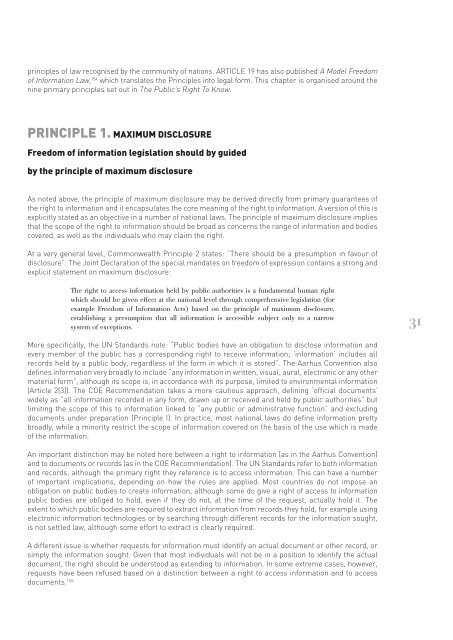Freedom of Information: A Comparative Legal Survey - Federation of ...
Freedom of Information: A Comparative Legal Survey - Federation of ...
Freedom of Information: A Comparative Legal Survey - Federation of ...
You also want an ePaper? Increase the reach of your titles
YUMPU automatically turns print PDFs into web optimized ePapers that Google loves.
principles <strong>of</strong> law recognised by the community <strong>of</strong> nations. ARTICLE 19 has also published A Model <strong>Freedom</strong><br />
<strong>of</strong> <strong>Information</strong> Law, 154 which translates the Principles into legal form. This chapter is organised around the<br />
nine primary principles set out in The Public’s Right To Know.<br />
PRINCIPLE 1. MAXIMUM DISCLOSURE<br />
<strong>Freedom</strong> <strong>of</strong> information legislation should by guided<br />
by the principle <strong>of</strong> maximum disclosure<br />
As noted above, the principle <strong>of</strong> maximum disclosure may be derived directly from primary guarantees <strong>of</strong><br />
the right to information and it encapsulates the core meaning <strong>of</strong> the right to information. A version <strong>of</strong> this is<br />
explicitly stated as an objective in a number <strong>of</strong> national laws. The principle <strong>of</strong> maximum disclosure implies<br />
that the scope <strong>of</strong> the right to information should be broad as concerns the range <strong>of</strong> information and bodies<br />
covered, as well as the individuals who may claim the right.<br />
At a very general level, Commonwealth Principle 2 states: “There should be a presumption in favour <strong>of</strong><br />
disclosure”. The Joint Declaration <strong>of</strong> the special mandates on freedom <strong>of</strong> expression contains a strong and<br />
explicit statement on maximum disclosure:<br />
The right to access information held by public authorities is a fundamental human right<br />
which should be given effect at the national level through comprehensive legislation (for<br />
example <strong>Freedom</strong> <strong>of</strong> <strong>Information</strong> Acts) based on the principle <strong>of</strong> maximum disclosure,<br />
establishing a presumption that all information is accessible subject only to a narrow<br />
system <strong>of</strong> exceptions.<br />
More specifi cally, the UN Standards note: “Public bodies have an obligation to disclose information and<br />
every member <strong>of</strong> the public has a corresponding right to receive information; ‘information’ includes all<br />
records held by a public body, regardless <strong>of</strong> the form in which it is stored”. The Aarhus Convention also<br />
defi nes information very broadly to include “any information in written, visual, aural, electronic or any other<br />
material form”, although its scope is, in accordance with its purpose, limited to environmental information<br />
(Article 2(3)). The COE Recommendation takes a more cautious approach, defi ning ‘<strong>of</strong>fi cial documents’<br />
widely as “all information recorded in any form, drawn up or received and held by public authorities” but<br />
limiting the scope <strong>of</strong> this to information linked to “any public or administrative function” and excluding<br />
documents under preparation (Principle I). In practice, most national laws do defi ne information pretty<br />
broadly, while a minority restrict the scope <strong>of</strong> information covered on the basis <strong>of</strong> the use which is made<br />
<strong>of</strong> the information.<br />
An important distinction may be noted here between a right to information (as in the Aarhus Convention)<br />
and to documents or records (as in the COE Recommendation). The UN Standards refer to both information<br />
and records, although the primary right they reference is to access information. This can have a number<br />
<strong>of</strong> important implications, depending on how the rules are applied. Most countries do not impose an<br />
obligation on public bodies to create information, although some do give a right <strong>of</strong> access to information<br />
public bodies are obliged to hold, even if they do not, at the time <strong>of</strong> the request, actually hold it. The<br />
extent to which public bodies are required to extract information from records they hold, for example using<br />
electronic information technologies or by searching through different records for the information sought,<br />
is not settled law, although some effort to extract is clearly required.<br />
A different issue is whether requests for information must identify an actual document or other record, or<br />
simply the information sought. Given that most individuals will not be in a position to identify the actual<br />
document, the right should be understood as extending to information. In some extreme cases, however,<br />
requests have been refused based on a distinction between a right to access information and to access<br />
documents. 155<br />
31
















